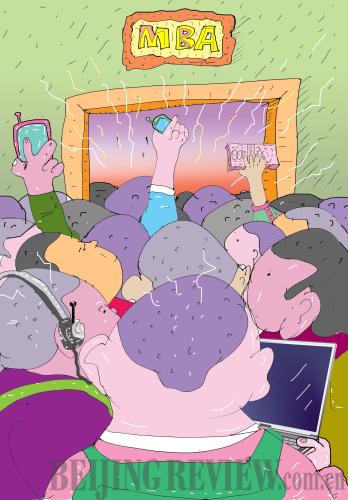|
 |
|
(LI SHIGONG) |
The tuition is 70,000 yuan ($10,300) a year and there are only 11 students in the class. Its curriculum aims to transform them into future business leaders and guarantees their admission into U.S. universities.
The Chengdu Sanyuan Foreign Languages School has opened a special class that has been dubbed the "Juvenile MBA" program. Its objective—to train "future business leaders and elites." The special program highlights China's traditional culture, Confucianism, martial arts and social etiquette.
With a greater number of students choosing to go abroad after graduating from middle school, the college entrance examination no longer monopolizes Chinese students' education. Sanyuan School's "Juvenile MBA" program, which was launched on September 1, abandons exam-oriented education to try to enhance students' competitiveness for future overseas studies. The parents of the 11 students are wealthy business executives, property tycoons and mine owners.
While some people, including parents, believe it is worthwhile investing in children's education and the program is helping to explore a new avenue in China's educational system, others are expressing doubts. They argue that uneven distribution of educational resources will lead to widening disparity. Some people believe the current education system is deteriorating into a diploma mill for ignorant, and spoilt, wealthy students.
Innovation in education
Wang Xudong (Shenzhen Economic Daily): It's not necessarily a bad thing there is an education program tailor-made for children of the rich. In the next five to 10 years, many of the first rich generation, most business leaders in certain areas, will transfer their businesses to their children, so parents are very attentive to their children's education, which is giving rise to a quite lucrative education market for the "second rich generation." This actually is also a good opportunity for the development of private schools. In China, public schools offer compulsory education while private schools have the freedom to try innovation. If children from rich families can really be trained as excellent business leaders, it's lucky for their families; if customized education teaches them to pay more attention to social responsibility, it's a good thing for the whole of society.
Ma Longsheng (Yangcheng Evening News): Although it is a profit-driven program, that reason alone will never degrade the "Juvenile MBA" program.
Regular education, including MBA programs, is likely to produce stereotypical graduates, who will not be as flexible in dealing with future business affairs. To be outstanding business leaders, apart from general knowledge, aspirants need special capabilities. The "Juvenile MBA" program is able to make up for regular education.
Maybe degrees and diplomas of the students of the "Juvenile MBA" program are not accepted by society, but the children's careers are to succeed their parents and operate their family businesses well. They do not care so much about the acceptance of qualifications by the general public, but value their own abilities and believe as long as the educational model and content suit them, it's enough. There is actually a great demand for this type of education in China.
Meng Sigui (Sichuan Daily): Customized education is becoming a trend nowadays. The launch of the "Juvenile MBA" program in a private school shows some educators have started to abandon traditional educational modes and are paying closer attention to social demand.
The "Juvenile MBA" program is actually an indication that China's compulsory education is fully developed. When compulsory education has covered everything necessary, people begin to ask for more from education. At the same time, the program shows education no longer serves only the college entrance examination, but begins to focus on individuals' interests and capabilities.
| 